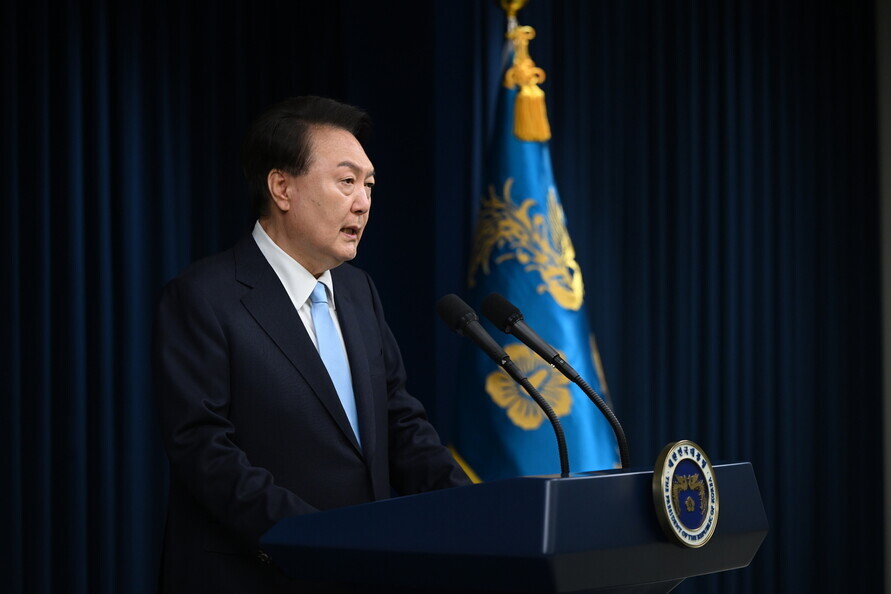hankyoreh
Links to other country sites 다른 나라 사이트 링크
[Editorial] Yoon addresses nation, but not problems that plague it

On Monday, South Korean President Yoon Suk-yeol delivered a televised message to the nation. It was his third such statement to the public since taking office, and it drew considerable attention, coming as it did with the general election just around the corner.
But in the course of that 51-minute message, Yoon made it clear that he has no intention of changing his approach to affairs of state. It included no signs of reflection on or adjustments to any aspect of his administration, including the issue of increasing the nationwide medical college admission cap, which is showing signs of dragging into the long term.
The statement was focused on health care reforms, including the cap increase, which has become the biggest issue today.
Yoon devoted considerable time to explaining why the increase needed to be 2,000 seats. Offering a point-by-point rebuttal of the medical community’s claims, he signaled his commitment to not repeating the same frustrations and failures met by past administrations.
At the same time, he did not share any kind of exit strategy for escaping the current stalemate in the conflict between the administration and physicians.
Whatever the justification may be for these reforms, the public starts to feel increasingly fatigued when things drag out for too long. The same is true for increasing the medical college admission cap.
Meanwhile, the health care vacuum created by the long-term collective action by interns, residents, and other physicians has gone beyond the level of a “concern” to become an urgent reality.
To be sure, the physicians have crossed the line with their actions, rejecting any kind of negotiations while demanding discussions on walking the government’s plan back and scrapping it completely. The public is well aware of this as well. But they’re also feeling frustrated with their president.
In his statement, Yoon stressed that politics is about “resolving issues that relate to our public.” If that’s the case, an emphasis on “principles” and “commitment” is not enough — the statement should also have included some approach that might at least lead to a resolution of this problem.
Without any of those kinds of preparations, he simply kicked the ball over to the physicians, calling on them to “come up with a unified proposal.” Is this any way to resolve the issue? As the confrontation between doctors and the administration drags on, it’s innocent South Koreans who end up suffering.
There are many other issues that the government is dealing with besides the medical school admission cap. The president should be offering answers on matters such as livelihood struggles — including skyrocketing inflation, with no signs of countermeasures — and the appointment and subsequent resignation of Lee Jong-sup as ambassador to Australia.
Many in the ruling People Power Party have been calling for days on end for the president to show some signs of concession, amid growing worries about the prospects of an election defeat. But Yoon made no mention of this.
Instead, he spoke of his record of “boldly implementing even unpopular policies,” citing achievements with his hard-line response to a Cargo Truckers’ Solidarity Division strike, fiscal soundness, improving relations with Japan, and restoring the nuclear power ecosystem.
While he mentioned these as a way of emphasizing his commitment to health care reforms, it came across as reiterating his “my way or the highway” approach.
A day earlier, he vowed to be “humbler” and “listen to even the smallest voices from the public.” Was this just empty rhetoric? We can only wonder why he delivered this statement to the public at all.
Please direct questions or comments to [english@hani.co.kr]

Editorial・opinion
![[Column] Season 2 of special prosecutor probe may be coming to Korea soon [Column] Season 2 of special prosecutor probe may be coming to Korea soon](https://flexible.img.hani.co.kr/flexible/normal/500/300/imgdb/original/2024/0426/3317141030699447.jpg) [Column] Season 2 of special prosecutor probe may be coming to Korea soon
[Column] Season 2 of special prosecutor probe may be coming to Korea soon![[Column] Park Geun-hye déjà vu in Yoon Suk-yeol [Column] Park Geun-hye déjà vu in Yoon Suk-yeol](https://flexible.img.hani.co.kr/flexible/normal/500/300/imgdb/original/2024/0424/651713945113788.jpg) [Column] Park Geun-hye déjà vu in Yoon Suk-yeol
[Column] Park Geun-hye déjà vu in Yoon Suk-yeol- [Editorial] New weight of N. Korea’s nuclear threats makes dialogue all the more urgent
- [Guest essay] The real reason Korea’s new right wants to dub Rhee a founding father
- [Column] ‘Choson’: Is it time we start referring to N. Korea in its own terms?
- [Editorial] Japan’s rewriting of history with Korea has gone too far
- [Column] The president’s questionable capacity for dialogue
- [Column] Are chaebol firms just pizza pies for families to divvy up as they please?
- [Column] Has Korea, too, crossed the Rubicon on China?
- [Correspondent’s column] In Japan’s alliance with US, echoes of its past alliances with UK
Most viewed articles
- 1‘We must say no’: Seoul defense chief on Korean, USFK involvement in hypothetical Taiwan crisis
- 2Why Kim Jong-un is scrapping the term ‘Day of the Sun’ and toning down fanfare for predecessors
- 3Two factors that’ll decide if Korea’s economy keeps on its upward trend
- 4BTS says it wants to continue to “speak out against anti-Asian hate”
- 5After election rout, Yoon’s left with 3 choices for dealing with the opposition
- 6Gangnam murderer says he killed “because women have always ignored me”
- 7South Korea officially an aged society just 17 years after becoming aging society
- 8AI is catching up with humans at a ‘shocking’ rate
- 9Ethnic Koreans in Japan's Utoro village wait for Seoul's help
- 1046% of cases of violence against women in Korea perpetrated by intimate partner, study finds